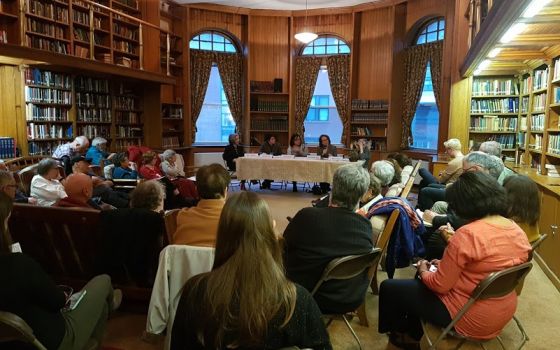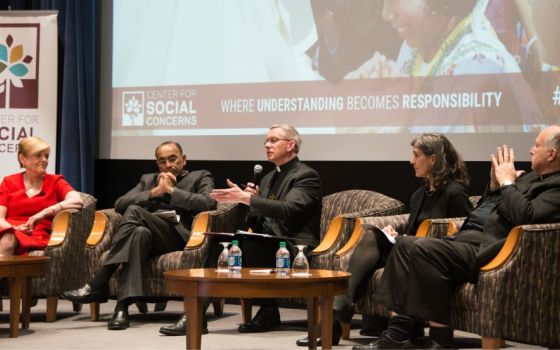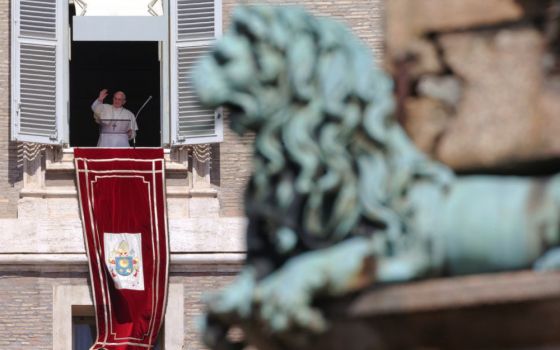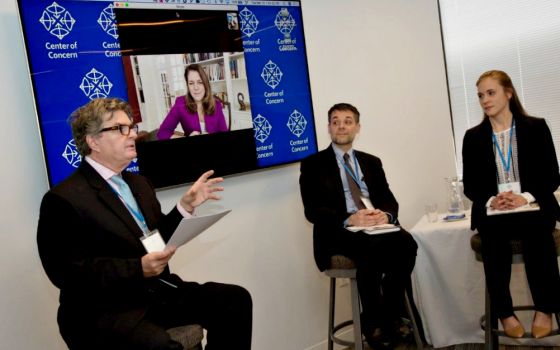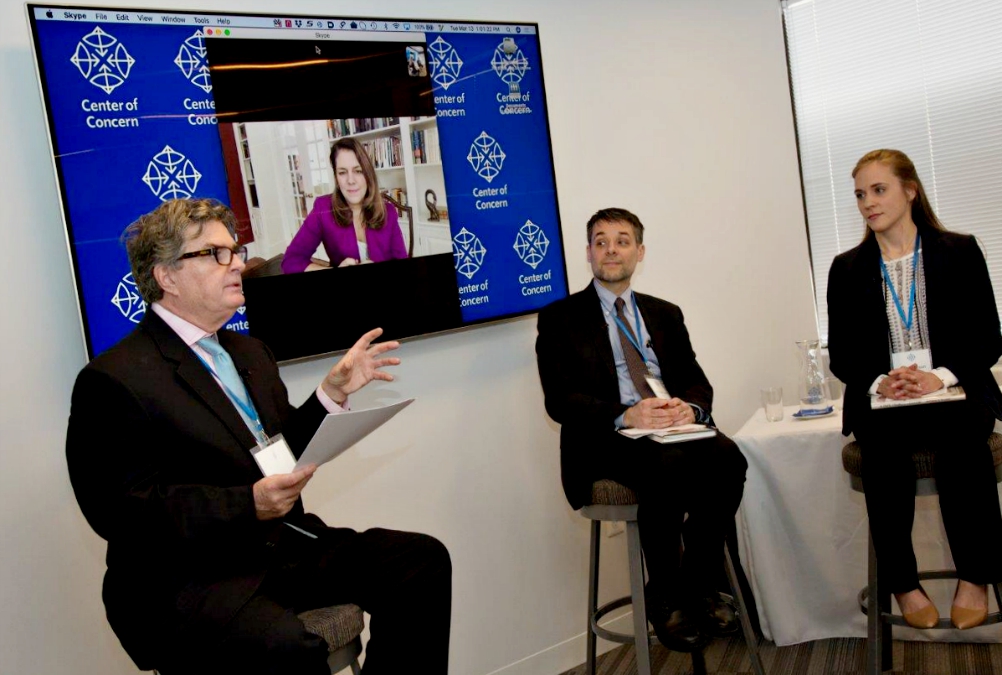
From left: Kevin Locke, Kerry Alys Robinson (onscreen), Massimo Faggioli and Jordan Denari Duffner discuss the pontificate of Pope Francis during a March 13 panel discussion at Center of Concern headquarters in Washington, D.C. (Center of Concern/Michael Carpenter Photography)
Catholic commentators gathered on March 13, the fifth anniversary of Pope Francis' election, to discuss his pontificate, including his relationship with youth, his leadership style and the culture of the Roman Curia. The audience included the papal nuncio to the United States, Archbishop Christophe Pierre, who offered closing reflections and a blessing as the crowd toasted the pope with prosecco and cake.
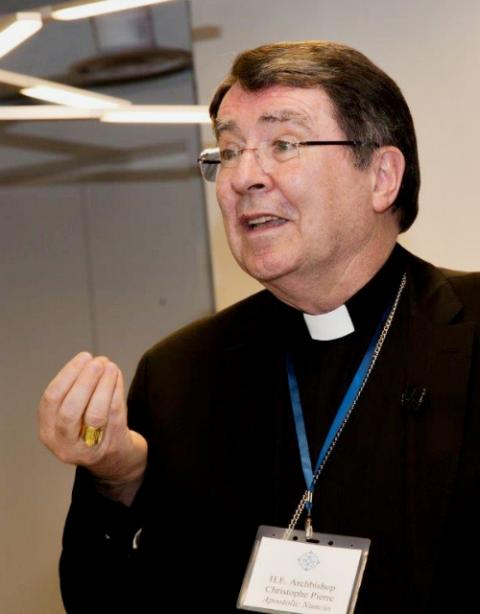
Archbishop Christophe Pierre, papal nuncio to the U.S. (Center of Concern/Michael Carpenter Photography)
Speaking of Francis' vision of reform for the church, Pierre said, "I think he was elected because of the Holy Spirit," which elicited laughter from the crowd of about 50 people, "but also because there was a need."
Noting that he has seen a difference in the church in the five years since Francis became pope, Pierre added, "A lot of people are listening to the voice of a leader who is asking them to be aware of the change of time. To go out and be witness of the Gospel. This is the main change. Change of structures is not the main thing for this pope."
The panel discussion included Jordan Denari Duffner, who writes on Muslim-Catholic relations; Massimo Faggioli, a theology and religious studies professor at Villanova University; and Kerry Alys Robinson, founding executive director of Leadership Roundtable, who joined the discussion via Skype from her snowbound home in Connecticut.
Citing Francis' "words that shape hearts and minds, and words that shape history," Lester Myers, president of the Catholic advocacy think tank Center of Concern, kicked off the event, which was hosted by the center at its headquarters in Washington, D.C.
The conversation was framed around the recently released book A Pope Francis Lexicon: Essays by Over 50 Noted Bishops, Theologians & Journalists, to which the three panelists contributed chapters. Other contributors to the book include Cardinals Sean O'Malley, Joseph Tobin and Donald Wuerl; Jesuit Fr. James Martin; Carolyn Woo, former CEO of Catholic Relief Services; and Social Service Sr. Simone Campbell, executive director of the Network Catholic lobby.
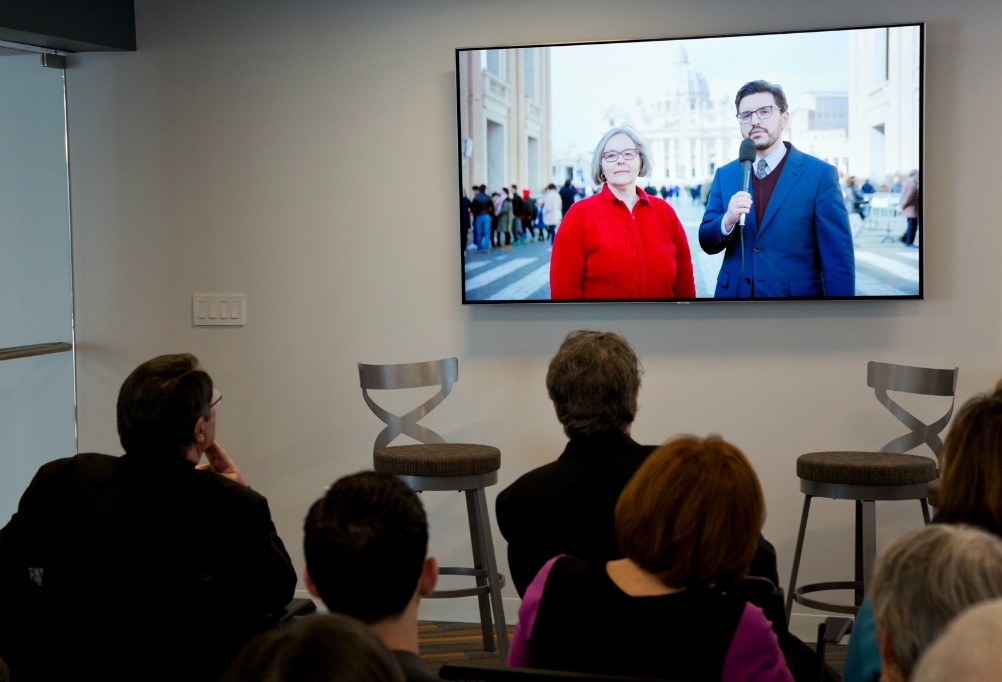
Cindy Wooden and Joshua McElwee, Rome correspondents for Catholic News Service and NCR, respectively, speak in a welcome video at the March 13 panel discussion of "A Pope Francis Lexicon," which they edited. (Center of Concern/Michael Carpenter Photography)
NCR's Rome correspondent Joshua J. McElwee and Catholic News Service Rome correspondent Cindy Wooden edited the book.
Duffner, an authority on Islamophobia, cited the pope's outreach to other faiths as key to any Catholic response to institutionalized racism and fear-mongering about Islam.
She declared herself "heartened" by the pope's gestures toward other faiths as an effort to remedy social problems, including praying with non-Catholics and asking them to pray for him. "He's not outright saying, 'Remember, we believe in the same God,' " but that's implied when Francis asks for their prayers, Duffner said.
She also addressed the pope's outreach to youth, a subject she wrote about for A Pope Francis Lexicon. She recounted the story of Francis finding his vocation to the priesthood at the age of 17, the same age she realized her vocation to become a writer. Both, she said, were moments of grace.
Francis encourages Catholic youth to seek such grace-filled encounters with the Lord through discernment and the daily examination of conscience, a tool of Ignatian spirituality, even, she wrote, when doing so "means eschewing society's expectations and focusing on God's countercultural call."
Advertisement
"I think Francis values people because of their youth. They bring something to the table that can't be brought by anyone else," said Duffner. "Youth are outsiders to power and leadership structures."
Duffner said that she had been invited to participate in a survey and Facebook group for the upcoming Synod of Bishops on young people. "If that's not a way to bring outsiders inside, then I don't know what is," she said.
Moderator Kevin Locke, director of Center Advisory at the Center of Concern and a former Jesuit, seconded her sentiment. "It's really a matter of welcoming the stranger," he said.
On the subject of leadership, Robinson used the word "ennobling" several times to describe Francis' style and his appeal to Catholics and non-Catholics alike. She also attributed his moral authority in part to his "authenticity" as a person and as a leader.
"His actions and words consistently match. There is an implicit integrity and cohesiveness to his life," Robinson said. "When I'm looking for role models on the global stage, he most certainly comes to mind. He ennobles us and calls us to have faith in humankind."
Non-Catholics often tell Robinson how much they "love" her pope, she said, which she attributes to the universal appeal of his embodiment of Christian charity, social justice and mercy, as well as his actions on behalf of the suffering and marginalized, including immigrants and refugees.
She also noted that, as a student of leadership, she is impressed by his commitment to managerial reform of the Curia — the administrative offices of the church — and financial accountability.
Francis' handling of the sexual abuse crisis, for which he has drawn harsh criticism in the last several months, did not come up.
In speaking of the Roman Curia, Italian native Faggioli called Francis "the most outsider of popes," one who neither studied nor worked in Rome before assuming the papacy.
Faggioli praised Francis for retaining that outsiderness and mused about writing a book on the "geography" of the pope's steps in Rome, the most memorable of which have included trips to prisons, jails and hospitals, and not, Faggioli pointed out, the Vatican or the Curia.
Calling the Holy See "the institutional, political projection of the Catholic Church," Faggioli predicted there would be more changes in the next five years, although he didn't try to guess what those might be.
"I wouldn't bet my money on what the Roman Curia will look like in five years or 10 years," he said. "I don't think it will go away easily. It is very, very easily able to defend itself."
[Julie Bourbon is an NCR contributor based in Washington.]





